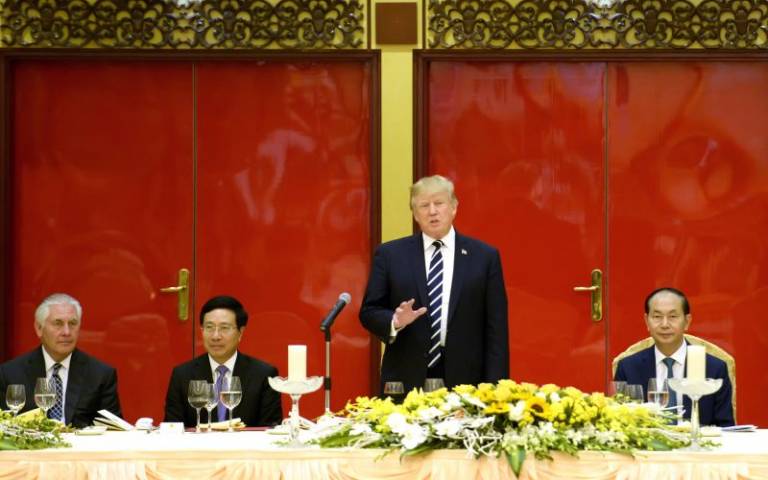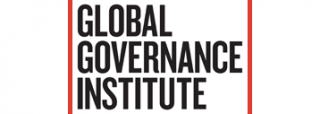Trump’s Trade Policy: An Exercise in Futility
26 November 2018
Amelie Bahr (MSc Global Governance and Ethics) on a GGI keynote lecture with Professor Douglas Irwin.

From threatening to quit the World Trade Organization (WTO) to initiating an outright trade war with China, Donald Trump’s approach to international trade has been the subject of much public and expert debate in recent months. With protectionist sentiments writ large, it appears the US president has ushered in a period of trade policy that stands in marked contrast to the policies favored both by the international establishment and his domestic predecessors.
In a recent lecture at the Global Governance Institute, Professor Douglas Irwin of Dartmouth College suggested that these developments are puzzling not only because the Trump administration lacks a coherent vision for its trade policy as a whole, but worse, its individual policies are informed by a deep misunderstanding about macroeconomics and international trade.
Trump’s stated objectives – be it reducing the American trade deficit or bringing jobs back to the US – have little to do with international trade to begin with, and are therefore unlikely to be solved by renegotiating trade agreements or imposing tariffs on various imported goods. In Irwin’s view, this makes Trump’s trade policy “an exercise in futility”.
NAFTA: much ado about nothing
Take the question of the American trade deficit, for instance. To present this as a problem in need of a solution is in itself a value judgment informed by the president’s business background rather than economic realities. Seen through Trump’s lens, the trade deficit reflects the position of the US as a ‘loser’ in the supposedly zero-sum political arena of international trade. Meanwhile, the relevance of the US dollar as an international reserve currency, which finances the domestic consumption of imported goods, is entirely overlooked as a contributor to the trade deficit.
To reduce the trade deficit, the Trump administration set about renegotiating the North American Free Trade Agreement (NAFTA), now renamed United States-Mexico-Canada Agreement (USMCA). However, trade agreements do not ensure specific outcomes but instead, lay down certain ground rules to determine the conditions of trade between the parties involved. To ensure a reduction in the trade deficit, which is a function of a country’s capital flows, one would, in fact, have to resort to managed trade. Thus, although the Trump administration has celebrated the new deal as a major break with the past, the renegotiations largely revolved around marginal issues, without revising the core elements of zero tariffs and market access.
Tariffs and their unintended consequences
The tariffs on steel and aluminum introduced by the Trump administration show a similar mismatch between the communicated goal – to bring back jobs to the US – and the approach used.
Jobs in the steel sector were lost above all due to technological progress and not increased imports. Figures show that the latter have in fact remained relatively stable over time. What is more, out of the total steel sold, over 70% is made in the US and the rest is imported overwhelmingly from US allies such as Canada and Mexico, calling into question the use of ‘national security’ concerns as a justification for the introduction of tariffs.
Far from creating employment opportunities, the imposed tariffs may, in fact, have the opposite effect: as the domestic price of steel is raised by the imposed tariffs, steel-consuming industries are struggling to compete both domestically and internationally and may have to resort to layoffs to cut these newly incurred costs. It is in this context that the Trump administration introduced bail-out packages and exemptions to soften the blows of its own policy decisions.
The way forward?
Irwin’s lecture exposed Trump’s trade policy as more symbolism than substance, in some sense completely removed from the realities of international trade as well as domestic industry demands. But Irwin was also eager to point out that, in part precisely because it is ill-informed and consists largely of ad-hoc measures, Trump’s trade policy holds real, and potentially long-term, consequences.
This will impact both domestic politics and the standing of the US as an international actor. While future presidents may be able to reverse the tariffs on steel and aluminum without much difficulty, the possibility of reaching a deal on trade with China that addresses larger power balances between the two countries now appears very remote.
On the international stage, Irwin emphasized that other countries should be careful to place checks on the US in trade negotiations so as to rein in future demands. There are already signs that US allies are forging new free trade agreements on their own, signaling that here once again, the actions of the Trump administration may ultimately be self-defeating: future US leaders may have to play catch-up to gain market access that current policies are jeopardizing.
 Close
Close


